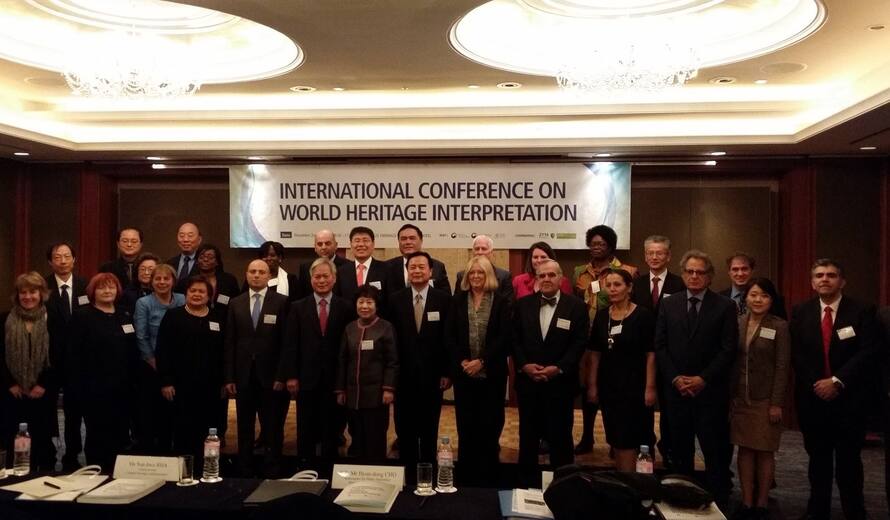International Conference on World Heritage Interpretation held in Republic of Korea
Hosted by the Ministry of Foreign Affairs (MOFA) of the Republic of Korea, the Cultural Heritage Administration (CHA) and the Korean National Commission for UNESCO (KNCU), an international conference on World Heritage Interpretation was held in Seoul, Republic of Korea on 2 November 2016.
The conference was attended by more than 100 participants including 14 Ambassadors of Permanent Delegations to UNESCO, the Director of the World Heritage Centre, experts from the ICOMOS International Committee on Interpretation and Presentation (ICPI), US National Park Service and other countries including Germany and China.
In his opening remarks Mr. Hyun-dong Cho, Ambassador for Public Diplomacy at the Ministry of Foreign Affairs in the Republic of Korea recalled that the conference was organized to promote the importance of heritage interpretation to recognize and conserve the diverse aspects of values embedded in or associated with World Heritage sites, including beyond its recognized Outstanding Universal Value. In the opening ceremony, Ambassador and Permanent Representative of Portugal to UNESCO Mr. J. F. Moraes Cabral reflected on interpretation as being among the strategic dimensions of World Heritage, stressing the need for our shared heritage to be inclusive, with a balanced and credible interpretation of the historical meaning and significance of the property.
The Director of the World Heritage Centre presented examples of sites listed as World Heritage on the basis of criterion (vi) in recognition of places of memory, and pointed out that other properties include multiple values related to remembrance and commemoration. Utilizing different international instruments and programmes such as the 2003 Convention on the Intangible Cultural Heritage, the Memory of the World programme within UNESCO, and global or regional approaches such as the International Coalition of Sites of Conscience, the European Heritage Label or the Slave Route project is also possible to recognize sites of memory. In order to be fully aware of the scope and background for understanding sites with associative values as having strong potential for future nominations for World Heritage, the need for a comprehensive thematic study to be undertaken to provide guidance for both inscription and management was emphasized.
ICOMOS-ICIP outlined the principles for World Heritage Interpretation as presented by the ICOMOS Charter, and the importance of acknowledging the historic narrative to be inclusive, with considerations for plurality. Examples of difficult histories being interpreted through appropriate on-site museums and information material were presented. The US National Park Service provided strategic objectives and implementation methodologies for site interpretation, addressing the multiple functions of interpretation as answering the need for better understanding of values, but at the same time promoting better protection, educational functions, and enhancing tourism. Cases from Germany where historic reconciliation was sought through World Heritage interpretation were also presented.
The challenges of facing difficult histories both internally and at the international level were addressed in other case studies. Throughout the discussions of the conference session, coherent linkage of interpretation and presentation was emphasized, with the need for such process to be based on a scientific and objective research on the sites whilst utilizing up-to-date technology for enhanced information outreach. The inclusion and involvement of diverse stakeholders at the individual, community, and institution levels were noted, as interpretation can encourage the sense of ownership of heritage, promoting global understanding of the property’s values, together with the participation of all those involved in its management and presentation. Participants agreed on the need of a more in-depth thematic study on heritage interpretation to be conducted within the scope of the World Heritage Convention. The thematic study should be able to determine the wide spectrum of memory heritage and the appropriate strategy to use for the interpretation of World Heritage sites and to assist States Parties and the World Heritage Committee in its deliberations.
